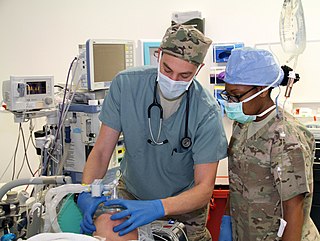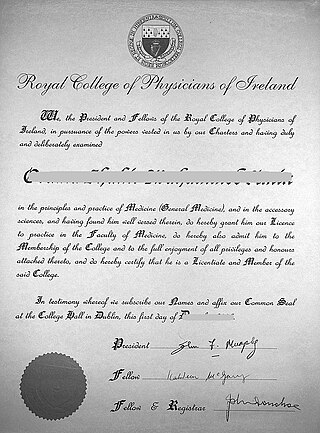Related Research Articles
A psychiatrist is a physician who specializes in psychiatry. Psychiatrists are physicians and evaluate patients to determine whether their symptoms are the result of a physical illness, a combination of physical and mental ailments or strictly mental issues. Sometimes a psychiatrist works within a multi-disciplinary team, which may comprise clinical psychologists, social workers, occupational therapists, and nursing staff. Psychiatrists have broad training in a biopsychosocial approach to the assessment and management of mental illness.
In the medical profession, a general practitioner (GP) or family physician is a physician who treats acute and chronic illnesses and provides preventive care and health education to patients of all ages. GPs' duties are not confined to specific fields of medicine, and they have particular skills in treating people with multiple health issues. They are trained to treat patients to levels of complexity that vary between countries. The term "primary care physician" is more usually used in the US. In Asian countries like India, this term has been replaced mainly by Medical Officers, Registered Medical Practitioner etc.

Anesthesiology, anaesthesiology, or anaesthesia is the medical specialty concerned with the total perioperative care of patients before, during and after surgery. It encompasses anesthesia, intensive care medicine, critical emergency medicine, and pain medicine. A physician specialized in anesthesiology is called an anesthesiologist, anaesthesiologist, or anaesthetist, depending on the country. In some countries the terms are synonymous, while in other countries they refer to different positions and anesthetist is only used for non-physicians, such as nurse anesthetists.
Doctor of Medicine is a medical degree, the meaning of which varies between different jurisdictions. In the United States, and some other countries, the M.D. denotes a professional degree. This generally arose because many in 18th-century medical professions trained in Scotland, which used the M.D. degree nomenclature. In England, however, Bachelor of Medicine, Bachelor of Surgery (M.B.B.S.) was used and eventually in the 19th century became the standard in Scotland too. Thus, in the United Kingdom, Ireland and other countries, the M.D. is a research doctorate, honorary doctorate or applied clinical degree restricted to those who already hold a professional degree (Bachelor's/Master's/Doctoral) in medicine. In those countries, the equivalent professional degree to the North American, and some others' usage of M.D. is still typically titled Bachelor of Medicine, Bachelor of Surgery.
The Professional and Linguistic Assessments Board (PLAB) test provides the main route for International Medical Graduates (IMGs) to demonstrate that they have the necessary skills and knowledge to practise medicine in the United Kingdom (UK). PLAB is a two part assessment that overseas doctors, from outside the European Economic Area and Switzerland, usually need to pass before they can legally practise medicine in the UK. It is conducted by the General Medical Council of the United Kingdom. The test is designed to assess the depth of knowledge and level of medical and communication skills possessed by the international medical graduates. The PLAB blueprint sets out what candidates are expected to demonstrate in the test and beyond.
The Royal College of Physicians of Ireland (RCPI), is an Irish professional body dedicated to improving the practice of general medicine and related medical specialities, chiefly through the accreditation of physicians by examination.

The Royal College of Emergency Medicine (RCEM) is an independent professional association of emergency physicians in the United Kingdom which sets standards of training and administers examinations for emergency medicine. The patron is The Princess Royal.
The Primary FRCA is a postgraduate examination in anaesthesia, more fully called the Primary Examination of the Diploma of Fellowship of the British Royal College of Anaesthetists (RCoA).

Medical education in Australia includes the educational activities involved in the initial and ongoing training of Medical Practitioners. In Australia, medical education begins in Medical School; upon graduation it is followed by a period of pre-vocational training including Internship and Residency; thereafter, enrolment into a specialist-vocational training program as a Registrar eventually leads to fellowship qualification and recognition as a fully qualified Specialist Medical Practitioner. Medical education in Australia is facilitated by Medical Schools and the Medical Specialty Colleges, and is regulated by the Australian Medical Council (AMC) and Australian Health Practitioner Regulation Agency (AHPRA) of which includes the Medical Board of Australia where medical practitioners are registered nationally.
Medical education in the United Kingdom includes educational activities involved in the education and training of medical doctors in the United Kingdom, from entry-level training through to continuing education of qualified specialists. A typical outline of the medical education pathway is presented here. However training schemes vary in different pathways may be available.
The Final FRCA is a postgraduate examination in anaesthesia, more fully called the Final Examination of the Diploma of Fellowship of the Royal College of Anaesthetists.
Following is a partial list of professional certifications in financial services, with an overview of the educational and continuing requirements for each; see Professional certification § Accountancy, auditing and finance and Category:Professional certification in finance for all articles. As the field of finance has increased in complexity in recent years, the number of available designations has grown, and, correspondingly, some will have more recognition than others. Note that in the US, many state securities and insurance regulators do not allow financial professionals to use a designation — in particular a "senior" designation — unless it has been accredited by either the American National Standards Institute or the National Commission for Certifying Agencies.
Fellow of the Royal Australasian College of Physicians, abbreviated as the post-nominal initials FRACP, is a recognition of the completion of the prescribed postgraduate specialist training programme in internal adult or internal paediatric medicine of the Royal Australasian College of Physicians.
In Canada, a medical school is a faculty or school of a university that trains future medical doctors and usually offers a three- to five-year Doctor of Medicine (M.D.) or Doctor of Medicine and Master of Surgery degree. There are currently 17 medical schools in Canada with an annual admission success rate normally below 7.5%. As of 2021, approximately 11,500 students were enrolled in Canadian medical schools graduating 2,900 students per year.
Member of the Royal College of Psychiatrists (MRCPsych) is a postnominal qualification awarded to physicians who have completed the prescribed training requirements and membership examinations mandated by the Royal College of Psychiatrists. MRCPsych is awarded after the completion of the required amount of clinical practice and successful completion of examinations. A further three years within psychiatry and a certificate of completion of specialist training are required to register as a psychiatrist on the General Medical Council specialist register. The examination has undergone a radical change in the past few years, notably in terms of focus and structure.
The Fellow of College of Physicians and Surgeons (FCPS) is a fellow of College of Physicians and Surgeons Pakistan (CPSP) who holds a professional qualification (fellowship) awarded after completing specialized training in a selected area of specialization and passing the examination in that particular specialty.
The actuarial credentialing and exam process usually requires passing a rigorous series of professional examinations, most often taking several years in total, before one can become recognized as a credentialed actuary. In some countries, such as Denmark, most study takes place in a university setting. In others, such as the U.S., most study takes place during employment through a series of examinations. In the UK, and countries based on its process, there is a hybrid university-exam structure.
Membership of the Royal College of General Practitioners (MRCGP) is a postgraduate medical qualification in the United Kingdom (UK) run by the Royal College of General Practitioners (RCGP). On successful completion of the assessment, general practitioners are eligible to use the post-nominal letters MRCGP that indicate Membership of the RCGP.
The Triple Qualification (TQ) was a medical qualification awarded jointly by the Royal College of Surgeons of Edinburgh, the Royal College of Physicians of Edinburgh and the Faculty of Physicians and Surgeons of Glasgow between 1884 and 1993. Successful candidates could register with the General Medical Council (GMC) and practise medicine in the United Kingdom. It was a route used by international medical graduates and those unable to gain entry to university medical schools, which included women in the late 19th century and refugee medical students and doctors throughout the 20th century.

Membership of the Royal College of Physicians of Ireland (MRCPI) is a postgraduate medical qualification in the field of general internal medicine awarded by the Royal College of Physicians of Ireland (RCPI) thorough examination. The MRCPI in general internal medicine is accredited by the Irish Medical Council as the foremost knowledge-based assessment for internal medicine in Ireland. In addition, many countries worldwide recognize the qualification as a postgraduate degree in internal medicine and designate its holder as a specialist physician. The 3 parts of the MRCPI examinations are held throughout the Republic of Ireland and its overseas centers. As of April 21, 2022, according to the RCPI's examination calendar 2022, the RCPI does not seem to conduct any examination in India. The MRCPI in general internal medicine is the flagship qualification and examination of the RCPI and should be differentiated from its other postgraduate qualifications awarded through examinations in other specialities.
References
- ↑ "RCEM Curriculum 2015" (PDF).
- ↑ "Exam Regulations and Policies". RCEM. Retrieved 2024-01-16.
- ↑ "Exam Regulations and Policies". RCEM. Retrieved 2024-01-16.
- ↑ "Exam Regulations and Policies". RCEM. Retrieved 2024-01-16.